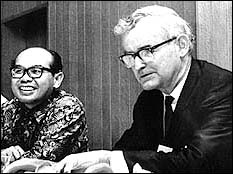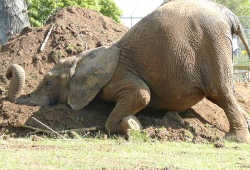Dorothy – 30/7/99
“A life of unbelievable privilege” –
an interview with the Very Rev. Dr Alan Brash. Part 2 – beyond New Zealand.
If you haven’t already done so, you may wish to read Part One of this series.
Youth conferences addressed by overseas speakers Highlights in the years between 1957 and 1964 were the four National Youth
Conferences where 1000 to 1500 young people from different denominations
gathered to share views and worship. The conferences were so large that
they could afford to bring from overseas speakers like George McLeod from
Scotland, Philip Potter from Geneva and M. M. Thomas from India.
New Zealand and Australia accepted as part of Asia Alan describes the years back in the National Council of Churches (NCC) as
exciting times. The Asian churches were forming their own regional council
and to the great surprise of the churches in New Zealand and Australia the
Asians said that these countries were part of Asia, and in 1957 invited
them to join their initial conference at Prapat in Sumatra, Indonesia.
Formation of the East Asia Christian Conference (EACC) Bishop Rich, the Anglican Bishop of Wellington, and Alan went to that conference
which resulted in the formation of the East Asia Christian Conference.
Alan returned from the conference on the staff of the new body to work half
time for the New Zealand NCC and half time for the EACC – “a totally surprising development”.
From 1957 to 1964 he continued to work for both organisations. Travel was
slow and difficult. He was away from home a great deal and Eljean took most
of the responsibility for the care of home and family. She believed in
the work Alan was doing and was prepared to make sacrifices to allow him to
do it.
Opening New Zealanders’ minds to Asia In his New Zealand work Alan spent a lot of time going up and down the country talking about how much New Zealanders had to learn from Asia. For
this work he was awarded an Order of the British Empire (O.B.E.).
In New Zealand we had talked about the “younger churches” of Asia – but
India has a church founded nearly 2000 years ago and Indonesia has more
church-attending Christians than the number in New Zealand and Australia
combined and doubled.
Work with disaster relief In his new role Alan was in charge of the churches’ programme for relief in
disasters – a devastating job. He didn’t know what poverty really was until he went to Asia. He visited the sites of tidal waves, floods, earthquakes and famines, and communicated with the World Council of Churches and the Asian churches to let them know what was the best form of
support for the local churches in the disaster areas. It involved endless travel and often heartbreaking work.
Move to Singapore From 1964 Alan and Eljean lived in Singapore, and Alan worked full time for
the EACC as Secretary for Mission and Service. To maintain full contact
with the WCC he made frequent trips to its headquarters in Geneva.
Working in countries all over Asia Language was a problem. As Alan visited a new country every week or fortnight, trying to learn relevant languages was impossible, and he had to
rely on interpreters which, especially when he was preaching, was a great
difficulty.
Increasing struggle for independence by the Asian churches Asian churches wanted to be free of the work of western missionaries and to
cope without the domination of western relief agencies. They were in nations that were becoming independent and the churches were trying to share in the process of nation building.
Impact on issues of faith Working in Asia made Alan increasingly aware of the vast variety of Christian movements – differing not only in language and cultural background, but also in their understanding of the Gospels, the way the
Bible is read and the style of worship. He realised that if ever the churches were to get closer together they would have to learn to ignore
those differences. Jesus himself commended the faith of people with incredibly different beliefs, ranging from devout Hebrews to the Roman soldier who believed that Jesus could heal his servant without seeing him.
Amsterdam Assembly of the World Council of Churches The marvel of the ecumenical movement is that in 1948 at the Amsterdam Assembly 146 different churches came together and said that they were going
to stay together, pray together and work together. It had never happened
before. Bishop Temple called it “the great new fact of our time”. Now
there are over three hundred churches in the WCC.
Appointment in Britain Alan’s next move was to accept an invitation to become Director of Christian Aid in 1968. This was the combined churches’ relief body in Britain – a large organisation with fifty staff in the head office in London and fifty representatives in other cities. The annual giving was two
million pounds, which increased to three million over the next three years.
Alan’s concern was that as a Presbyterian clergyman he might not be permitted to preach in pulpits of the Church of England, but this was not a
problem. During his three years in the position he was welcomed to preach
to congregations all over Britain, from tiny village churches to Westminster Abbey, York Minster and Coventry Cathedral.
His work took him far beyond Britain. He travelled to over seventy countries in every continent, in his years of international ecumenical service.
Director of the Division of Inter Church Aid and Service to Refugees at
the WCC Alan was reluctant to leave his position in Britain after only three years
as he felt he had an increasing understanding of the demands of the job,
but the WCC was insistent that he move to work for them in Geneva. For six
months he again overlapped two jobs.
|
|
| Alan Brash at a committee meeting of the World Council of Churches with General T.B. Simatupang of Indonesia (WCC President) to the left. Photo source Alan Brash |
The Division of Inter Church Aid was the largest in the WCC. There were
over thirty members of staff. They dealt with programmes all over the world
and transferred something like seventy million US dollars every year. They
were also one of the major agencies with millions of refugees.
It was a meeting place of the donor agencies of the big churches and of the
people who worked where the money was spent. Some of the donor nations
were very generous, but wanted to control exactly how the money was spent.
The Asian and African churches who needed the support were unhappy with
this attitude. Often Alan had to provide a placating voice ensuring that
the people who needed the money had the final say in how it was spent. Having sat so long with the Asian churches and had recent contact with churches in African countries Alan was able to understand how they were
feeling.
Fulfilment in aid work, but pressure to change Alan valued being able to work in the aid area because his major concern
was, and still is, the gap between the wealthy and the poor. However, once
again he was put under pressure to move, this time to a job where he was
much more concerned with church relations.
Read NZine next week for Part 3 of this interview, describing Alan Brash’s continued involvement in the work of the Church internationally and
in New Zealand.




